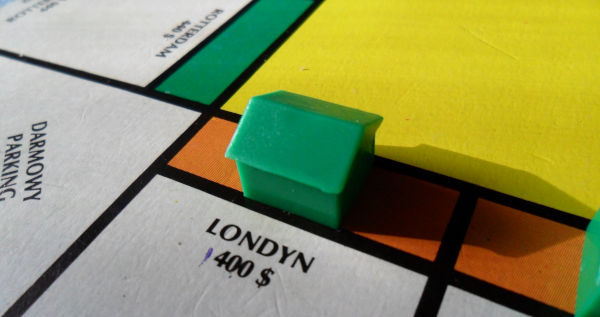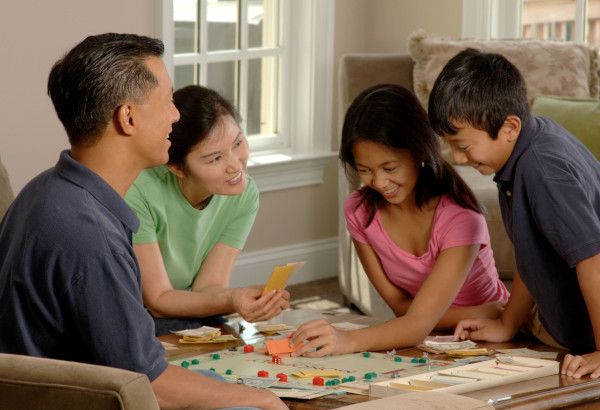Do I Actually Hate Monopoly?
I’ve had Monopoly on my mind this week as I recently played a round of Sharkopoly with the family. Aside from its selachian veneer, Sharkopoly is essentially identical to the classic board game Monopoly,1 much like the thousands of other Monopoly versions.2 It would be an understatement to describe me as reluctant Monopoly player. Although I would never have described myself as a “Monopoly Hater,” it’s an apt title. This time, despite my grumblings I found myself having a good time. As I reflected on this, I realized that my original position was reductionist, and in retrospect I was responsible for reckless repetition of board game geek talking points, a situation I now hope to redress.

This is not actually Monopoly
I actually enjoyed Monopoly as a child. I remember especially breaking out the board during Christmas holidays and playing marathon sessions with my family and friends. As I crew older I played the game less and less, my time instead spent on video games. During college we did have “family game night” where we would get together with friends and play games, usually lighter games. Still later, when I re-entered the board game hobby proper (with gateway games like Catan) I didn’t give much thought to Monopoly at all.
I wouldn’t be able to identify a single moment where I decided not to like Monopoly, but I imagine that as I was exposed more and more to “board gamer culture” I became exposed to popular anti-Monopoly3 sentiment, and found the seed of Monopoly-Hate planted and germinated in my heart. I won’t go into that just yet though. Instead, here is how I would have described my dislike of Monopoly had you asked me last Saturday.
Why I Hate[d] Monopoly
- Monopoly outcomes influenced more by chance than skill.
- Monopoly gameplay is defined by a positive feedback loop.
- Losers are eliminated for the game.
- People don’t follow the rules.
- Monopoly doesn’t deserve its success and position as the face of board games
There is a sixth reason (closely linked with the fifth) which is the origin of Monopoly is tragic and unfair. It is not included in the list because before I wrote this post I didn’t actually know about it.
Skill vs. Chance
All games exist on a skill/chance spectrum. On the “pure skill” side are games like Chess where all game states depend on player choices. On the “pure chance” side are games like Candy Land where players have no way to influence the game at all. Monopoly’s elements of chance certainly are more obvious than than it’s elements of skill. Movement is determined by the roll of die, and Chance and Community Chest cards are drawn at random. The skill is more subtle, for example when and when not to buy property, how to invest and develop properties, and how to negotiate trades, and even how long to stay in jail.4 Managing chance and risk is a skill in itself. Games of high chance can be frustrating because of lack of player agency to affect outcomes.
The Rich Get Richer
I think this is the point that cause people the most frustration, but in Monopoly, once you start being successful, it is easier to become more successful. The more properties you have, the more rent you collect, the more properties you can develop, the more rent you can collect, the more players you can bankrupt, the more rent you can collect, etc. This is a classic example of a positive feedback loop When you are on the losing end of this, it feels bad, because like games of high chance, it feel like you have little agency over the outcome of the game.
Eliminated
This feels self explanatory, but it feels bad to be playing a game, then get kicked out while your friends continue to play.
Read the Rules
There is a post on scribbe.com that goes into details, but most people learn to play Monopoly incorrectly, and the rules that are either overlooked or added often lead to longer game time.
Briefly, the most commonly missed (or added) rules are:5
BUYING PROPERTY
Whenever you land on an unowned property you may buy that property from the Bank at its printed price. You receive the Title Deed card showing ownership. Place the title deed card face up in front of you. If you do not wish to buy the property, the Bank sells it at through an auction to the highest bidder. The high bidder pays the Bank the amount of the bid in cash and receives the Title Deed card for that property.
Any player, including the one who declined the option to buy it at the printed price, may bid. Bidding may start at any price.
and:
FREE PARKING
A player landing on this place does not receive any money, property or reward of any kind. This is just a “free” resting-place.
If properties are not auctioned, it takes longer to acquire monopolies, and thus longer to knock players out of the game. If you let fees and taxes pile up in the middle and get awarded to players that land on Free Parking, it injects liquidity into the game, which again makes it take longer to eliminate players from the game. I posit that these house rules are meant to “fix” the feels bad of the element of chance and the positive feedback loop. However these rules issues only serve to spread the feels bad over a longer period of time.
Real Geeks Hate Monopoly
Jonathan Liu’s 2013 WIRED article Real Geeks Hate Monopoly suggests that it is unfair for Monopoly to represent the hobby of board gaming to the “masses,” and how their un-fun experiences with Monopoly shapes their opinion of board games at large. Others complain about how Monopoly is only successful today because it’s successful or say it’s terrible because winners win more but all the hate seems disproportionate to the supposed problem and generally unproductive. Others criticize Monopoly as a proxy for the problems of capitalism, as winning in Monopoly looks a lot like how how wealth is consolidated by the rich in the real world.

Look how much fun we are having!

Fun… Enhance!
What’s in a Game?
Monopoly isn’t a terrible game. I will take the enlightened stance that there are both better and worse games. Do I believe Monopoly deserves its success? Yes. Do I think that Monopoly’s success is proportional to it’s quality as a game? No. Do I think Monopoly does irreparable harm to board gaming as a hobby? No.
I think to further explore this we’d have to separate somehow Monopoly as a game, and Monopoly as a cultural artifact. There is a mismatch of expectations of what Monopoly is supposed to provide, and I think board gamers in general under estimate the impact of skill on Monopoly outcomes. I also wanted to spend more time talking about Monopoly as a perfect satire of capitalism, but I don’t have it in me this week, it’ll have to wait.
I won the game of Sharkopoly by the way. It was totally because of my skill, and not because Sharkopoly actually enforces the money-on-free-parking rule and I got a huge windfall that allowed me to develop my properties…
Further Reading
- The secret history of Monopoly: the capitalist board game’s leftwing origins
- Why Does Everyone Hate Monopoly: The secret history behind the world’s biggest board game
- You Don’t Hate Monopoly, You Just Suck at It
- The Most Landed On Property in Monopoly
- Video: Richard Garfield - “Luck in Games” talk at ITU Copenhagen
Footnotes
-
Which I assume every breathing person older than five has heard of. ↩
-
Most of these versions are simple re-skins of the original, but some of the official variants provide unique game play. Off the top of my head the variants I’ve played are Monopoly Junior (1990), Monopoly: Ultimate Banking, Monopoly Cheaters Edition, and Monopoly: The Mega Edition ↩
-
From what I can tell Monopoly hatred has a few variants, but in gaming circles criticism is mostly around the fun to popularity ratio. ↩
-
You still collect rent while in jail, so it can be advantageous to stay in jail and save up for a few turns without risk of landing on an opponents fully developed property. ↩
-
“Rules of Monopoly.” Official Game Rules, https://www.officialgamerules.org/monopoly. Accessed 1 April 2023. ↩